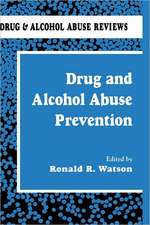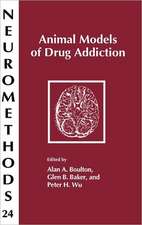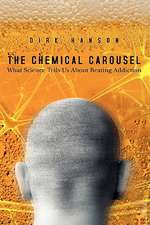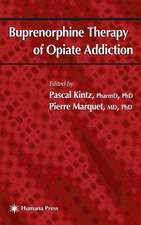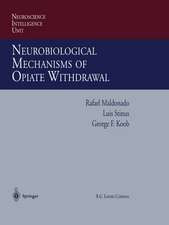Molecular Biology of Drug Addiction
Editat de Rafael Maldonadoen Limba Engleză Hardback – 12 sep 2002
| Toate formatele și edițiile | Preț | Express |
|---|---|---|
| Paperback (1) | 951.59 lei 6-8 săpt. | |
| Humana Press Inc. – 5 noi 2010 | 951.59 lei 6-8 săpt. | |
| Hardback (1) | 960.93 lei 6-8 săpt. | |
| Humana Press Inc. – 12 sep 2002 | 960.93 lei 6-8 săpt. |
Preț: 960.93 lei
Preț vechi: 1171.86 lei
-18% Nou
Puncte Express: 1441
Preț estimativ în valută:
183.88€ • 196.63$ • 153.31£
183.88€ • 196.63$ • 153.31£
Carte tipărită la comandă
Livrare economică 17 aprilie-01 mai
Preluare comenzi: 021 569.72.76
Specificații
ISBN-13: 9781588290601
ISBN-10: 1588290603
Pagini: 346
Ilustrații: X, 346 p. 3 illus.
Dimensiuni: 178 x 254 x 27 mm
Greutate: 0.89 kg
Ediția:2003
Editura: Humana Press Inc.
Colecția Humana
Locul publicării:Totowa, NJ, United States
ISBN-10: 1588290603
Pagini: 346
Ilustrații: X, 346 p. 3 illus.
Dimensiuni: 178 x 254 x 27 mm
Greutate: 0.89 kg
Ediția:2003
Editura: Humana Press Inc.
Colecția Humana
Locul publicării:Totowa, NJ, United States
Public țintă
ResearchCuprins
I. Opioid Addiction.- 1 Molecular Mechanisms of Opioid Dependence by Using Knockout Mice.- 2 Molecular Genetic Approaches.- 3 Opiate Addiction: Role of the cAMP Pathway and CREB.- 4 Different Intracellular Signaling Systems Involved in Opioid Tolerance/Dependence.- 5 Inhibitors of Enkephalin Catabolism: New Therapeutic Tool in Opioid Dependence.- II. Psychostimulant Addiction.- 6 Recent Advances in the Molecular Mechanisms of Psychostimulant Abuse Using Knockout Mice.- 7 Opioid Modulation of Psychomotor Stimulant Effects.- 8 Influence of Environmental and Hormonal Factors in Sensitivity to Psychostimulants.- 9 Development and Expression of Behavioral Sensitization: Temporal Profile of Changes in Gene Expression.- III. Cannabinoid Addiction.- 10 New Advances in the Identification and Physiological Roles of the Components of the Endogenous Cannabinoid System.- 11 Integration of Molecular and Behavioral Approaches to Evaluate Cannabinoid Dependence.- 12 Opioid System Involvement in Cannabinoid Tolerance and Dependence.- IV. Alcohol and Nicotine Addiction.- 13 Current Strategies for Identifying Genes for Alcohol Sensitivity.- 14 Genetic Basis of Ethanol Reward.- 15 Behavioral and Molecular Aspects of Alcohol Craving and Relapse.- 16 Molecular and Behavioral Aspects of Nicotine Dependence and Reward.
Recenzii
"I found this text to be a wonderful compilation...each chapter highlighted the use of recently established techniques to provide an improved understanding of the role of specific membrane transport pathways, hormone receptors, intracellular signaling pathways and even circulating hormone and drug levels deep within the brain." -Pharmaceutical Research
Textul de pe ultima copertă
Recent advances in molecular biotechnology have created powerful new models to clarify the neurobiological mechanisms involved in drug addiction. In Molecular Biology of Drug Addiction, leading authorities extensively survey these advances in a comprehensive multidisciplinary review of the most relevant molecular, genetic, and behavioral approaches used to investigate the neurobiological basis of drug addiction. In their exploration of the latest findings on opioid, psychostimulant, cannabinoid, alcohol, and nicotine addiction, the authors provide fresh insights into the genetic basis of drug addiction and the new therapeutic perspectives these have opened. They describe the technology available to generate conditional knockout mice and show how these mice can reveal the molecular basis of opioid, psychostimulant, and cannabinoid addiction. They also review the different behavioral models available to evaluate drug reward effects and analyze the genes involved in alcohol dependence.
State-of-the-art and multidisciplinary, Molecular Biology of Drug Addiction offers neuro- and pharmaceutical scientists a clear understanding of a vast and complex literature, illuminating the decisive progress that has recently occurred and outlining the direction of future research on addictive processes.
State-of-the-art and multidisciplinary, Molecular Biology of Drug Addiction offers neuro- and pharmaceutical scientists a clear understanding of a vast and complex literature, illuminating the decisive progress that has recently occurred and outlining the direction of future research on addictive processes.
Caracteristici
Includes supplementary material: sn.pub/extras









